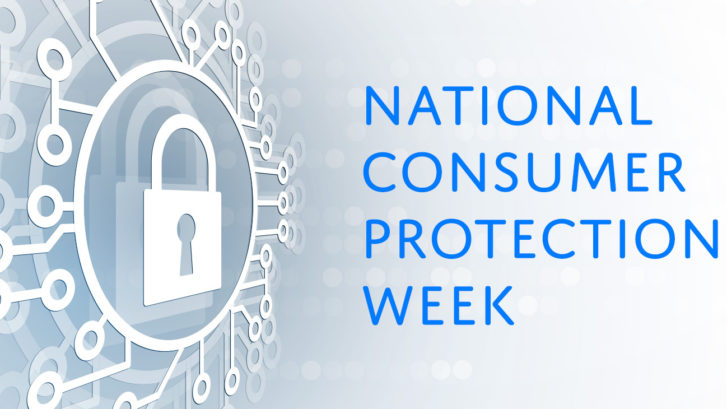Great businesses solve big problems.
Lately, there’s been a lot of attention on several pharmaceutical and biotech companies taking huge steps forward in solving the biggest problem we face today by developing COVID-19 vaccines. For all the death and long-term effects the novel coronavirus has hammered us with, its dark cloud has infected more than respiratory systems. The U.S. economy has struggled to breath over the last year. Unemployment has rapidly spread across the workforce past Great Recession peaks. And robocall fraudsters have infected consumers to pre-pandemic highs once again. The fight against malicious robocallers has taken many forms over the past year. The world was particularly vulnerable considering the confluence of compromised businesses and consumers, the devious new ways our weaknesses have been exploited, and the resulting fallout from it all.
In that sense, YouMail will spend National Consumer Protection Week (NCPW) as it does the other 51 weeks of the year: trying to solve the big problems of protecting consumers from the scourge of robocall scams.
In this article, we cover:
- The correlation between the pandemic and consumer fraud.
- Other fraud attempts over the past year: election attacks and big fines.
- How YouMail can help you celebrate National Consumer Protection Week.
NCPW occurring almost exactly a year after the pandemic began for most Americans is apropos. Though consumer protection isn’t a healthcare issue, the connections are stark. We saw robocalls take a precipitous drop in April 2020, an understandable phenomenon considering everyone’s norms were upended, criminals too. Since then, robocalls steadily rebounded through October 2020. Then perhaps mirroring a new outbreak of COVID cases, we saw a small drop in November, followed by another climb that brings us to our latest peak, 4.6 billion robocalls placed in February 2021, the highest since the same time last year.
What a journey consumers have been on over the past year.
We saw contact tracing efforts stymied by the nation’s reluctance to answer unfamiliar numbers. Think about that: even as the number of robocalls plummeted and the number of those infected by COVID skyrocketed, consumers were still so put off by the constant attack of annoying, often fraudulent robocalls, they were unwilling to answer legitimate phone calls meant to save their lives.
In the weeks leading up to the last presidential election, regular people were once again targeted, as voters were told to “stay safe and stay home,” leveraging fear to suppress the right to vote. Specific attacks were detected across Michigan. YouMail estimates that approximately 10 million of these “stay home” calls reached potential voters in the days leading up to the November 3 election. Voters in Flint, Michigan, received their own devious robocalls warning of long lines at the polls, encouraging them to wait until Wednesday, Nov. 4, to cast their ballots, after the deadline to vote. Similar text messages were also sent to residents of Dearborn, Michigan, warning of “ballot sensor” malfunctions. Now, in honor of NCPW, the state of Michigan released its top 10 consumer complaint categories for 2020, and unsurprisingly, robocalls topped the list with 5,516 complaints.
Michigan’s Attorney General office also filed suit last year against a pair Texas companies accused of using misleading robocalls to sell healthcare plans. In June 2020, the Federal Communications Commission (FCC) sought to collect $225 million in fines from JSquared Telecom and Rising Eagle Capital Group for placing as many 1 billion illegal robocalls using spoofed phone number in early 2019. And while astronomical fines may sound like an effective tool against this sort of illegal activity, it turns out that despite fining robocallers a combined $208 million between 2015 and March 2019, the FCC only collected a measly $6,790. “The threat of large fines as a deterrent means nothing if we systematically fail to actually collect on them,” per FCC commissioner Geoffrey Starks.
Fight Robocall Fraud
With all of these transgressions still occurring in a “down” year of robocall volume, and a new year of exploding volume, what are consumers to do? Well, happy National Consumer Protection Week! YouMail is celebrating by reminding consumers that you have more power to stop these malicious attacks than you might realize.
Are you following these three simple steps to keep your smartphone secure? They are free and easy to get started right away.
Are you aware of all the different types of scams assaulting consumers right now? Here are just 37 scams that you may have encountered or are likely to face, including an Apple iCloud scam, an employment recruiter scam, and a TV provider scam.
With so many phishing attempts, spoofing strategies, and misleading characters seeking to deceive by leveraging your greatest fears at any given moment, you need all the protection you can get. Whether you’re on iOS or Android, YouMail robocall blocking is available, free, and powerful in stopping robocall fraud in its tracks.
And make sure if an unknown number call you, you look it up in the YouMail Directory to find out if it’s making scam calls.
Visit http://www.ftc.gov/ncpw for additional free consumer education materials and to read the latest from consumer protection experts. Also check back on the YouMail blog regularly year-round for updates to protect yourself and your loved ones.
Stay safe, stay healthy, and keep looking for solutions to the big problems in life. Hopefully, we made things a little easier in 2020 and can do even more in 2021.





